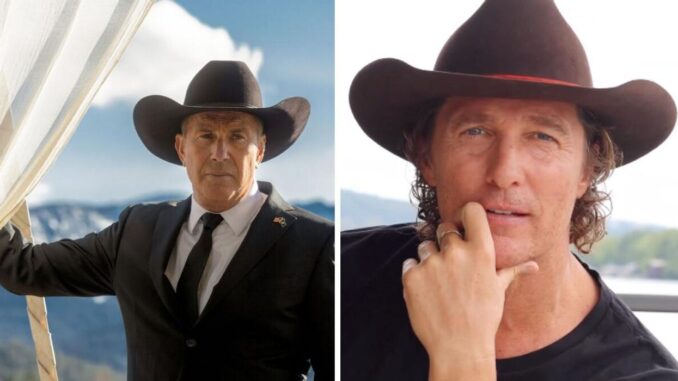
The Shadow of the Bunkhouse: Is John Dutton Really Gone? Unpacking the Yellowstone Season Finale
The dust-choked air of Montana, often a character unto itself in Taylor Sheridan’s sprawling saga, felt heavier than usual as the Yellowstone Season 5 Part 1 finale faded to black. Viewers were left suspended in a precipice of dread and uncertainty, a familiar yet ever-potent tactic of the show’s creator. The burning question echoing through the valleys and fan forums alike was not just about the fate of the Dutton ranch, but the very heart of its resistance: Is John Dutton really gone?
To unravel this knot, we must first revisit the tempestuous currents that defined the mid-season climax. John Dutton, now Governor of Montana, found himself ensnared in a political maelstrom of his own making. His attempts to preserve the ranch’s wild integrity by obstructing the airport development and enacting an unpopular conservation easement had painted a massive target on his back. Jamie, the prodigal and increasingly venomous son, seized this vulnerability, emboldened by the manipulative allure of Sarah Atwood. The finale saw Jamie initiating impeachment proceedings against his father, laying bare John’s politically precarious position.
The true gut punch, however, came not from the political maneuverings, but from the raw, exposed nerves of the Dutton family itself. Beth, ever the fiercely protective lioness, declared war on Jamie, promising a brutal, final end. Jamie, in turn, chillingly informed Beth that the only way to protect the ranch was to kill her, and John. This wasn't just sibling rivalry; it was an existential threat, a family feud escalating to Shakespearean tragedy. John, weary and disillusioned, seemed to accept his fate, musing aloud about the impossibility of winning, the crushing weight of his gubernatorial duties, and the relentless march of time against his way of life. The final shot of him, a solitary figure in the sprawling, indifferent landscape, was one of profound resignation, leaving audiences to wonder if this was a prelude to his exit.
So, is John Dutton truly gone? The answer, like the Big Sky country itself, is complex and layered, inviting both literal and metaphorical interpretations.
On one hand, the specter of Kevin Costner’s rumored behind-the-scenes conflicts and potential departure from the series undeniably fueled the literal "gone" theory. Media reports concerning scheduling disputes and a desire for Costner to focus on other projects lent a meta-narrative weight to John's onscreen weariness. Taylor Sheridan is also known for his ruthless storytelling; he’s not afraid to kill off beloved characters, as evidenced by the brutal, unflinching honesty of 1883. If John Dutton’s story arc has reached a narrative dead end – a point where his fight against progress is utterly unwinnable, leading to a metaphorical or literal "death" of his way of life – then his physical demise could be a shocking, albeit logical, conclusion. It would also serve as a dramatic pivot point, allowing the show to transition into its announced future iteration with Matthew McConaughey, focusing on the Dutton legacy rather than the current patriarch.
However, dismissing John Dutton entirely feels akin to ripping the heart out of Yellowstone. He is the show’s unwavering, albeit flawed, anchor. His fight is the show’s premise: the relentless battle to preserve a dying way of life, a vast tract of land, and a fractured family against the encroaching tide of modernity. Costner’s gravitas and iconic portrayal are intrinsic to the series’ massive appeal. To remove him would be a seismic creative risk, potentially alienating a significant portion of the viewership.
Moreover, Sheridan is a master of the dramatic cliffhanger and misdirection. The "train station" – a euphemism for the remote, unceremonious disposal of enemies – has been a constant threat, but it's typically a fate reserved for those who cross the Duttons, not necessarily for a Dutton himself. John's "gone" could be a political expiration: an impeachment that strips him of power, forcing him back to the ranch, humbled but still very much alive. This would be a form of narrative punishment, a stripping away of the very thing he reluctantly sought, leaving him free to defend his land through more traditional, if violent, means. It would shift the focus back to the ranch itself, where John is truly in his element, rather than the political arena where he clearly struggles.
Ultimately, the ambiguity is a testament to the show’s storytelling prowess. John Dutton's "gone" could signify a metaphorical death: the death of his hope, the erosion of his spirit, or the definitive end of his ability to steer the course of Montana. He might be physically present but spiritually broken, a ghost in his own life, watching his beloved ranch succumb to the pressures of the modern world. This interpretation allows Costner to remain, yet radically shifts the character’s trajectory, forcing other Duttons to step up and potentially inherit the impossible burden of the ranch.
The Yellowstone Season 5 Part 1 finale left us not with answers, but with a palpable sense of foreboding and a potent question that cuts to the core of the series. Is John Dutton truly gone? Perhaps not literally from the face of the earth, but certainly from the political stage, and potentially from the unwavering, unyielding figure we've come to know. The shadow cast by the bunkhouse is long, and within it, the future of the Dutton dynasty, and its beleaguered patriarch, remains shrouded in the haunting, beautiful, and uncertain expanse of the Yellowstone.
